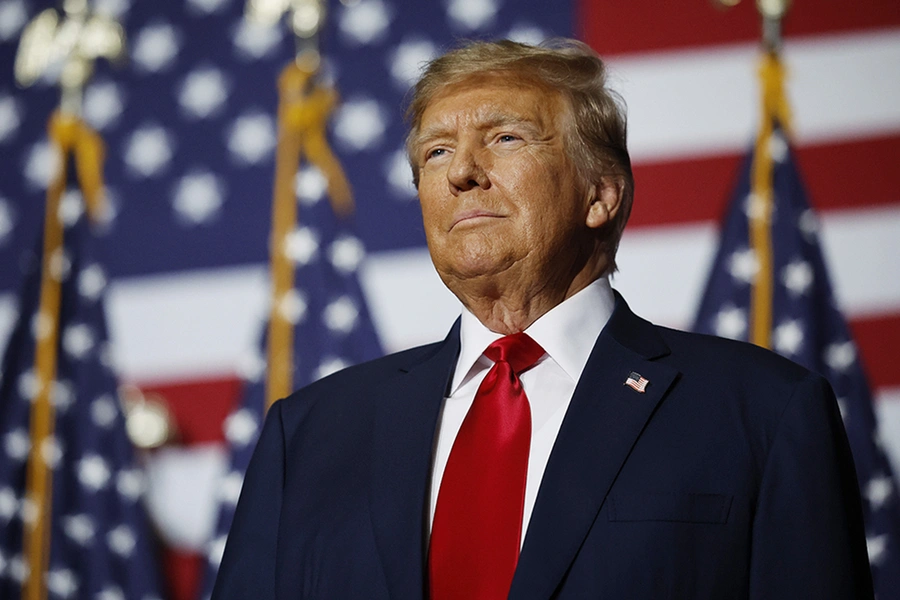
Introduction
On January 20, 2025, the United States will witness a significant event in its political landscape: the inauguration of president-elect Donald Trump. This ceremony not only marks the commencement of Trump’s second term but also coincides with Martin Luther King Jr. Day, a day dedicated to honoring the legacy of one of the greatest civil rights leaders in American history. The convergence of these two milestones provides a unique platform for reflection on the values of justice, equality, and leadership that Dr. King stood for, while considering the current political climate under Donald Trump’s returning administration.
This remarkable coincidence adds an additional layer of depth to the inauguration, as the nation will engage in discussions surrounding civil rights, social justice, and national unity. While Donald Trump has had a polarizing effect on American politics, his presidency has also catalyzed conversations about governance and civic responsibility. The people of the United States will be looking toward the future under Trump’s leadership, contemplating his policies and their potential impacts on both domestic and international landscapes.
Leading up to January 20, 2025, it is expected that various events and ceremonies will take place to celebrate this significant day. In addition, there will likely be a mixture of supporters rallying in favor of Donald Trump, as well as protests and movements aimed at addressing ongoing social issues. The presence of Martin Luther King Jr. Day within this context serves as a powerful reminder of the ongoing struggle for civil rights and the importance of unity in achieving societal progress.
This inauguration will not only set the tone for Trump’s new administration but will also invite renewed discussions about President Trump’s policies in light of Dr. King’s ideals, inspiring a broader dialogue on the path forward for the United States. The interplay between these events promises to frame a historic moment in American politics.
The Importance of Inauguration Day
Inauguration Day holds a profound significance in the American political landscape, marking the commencement of a new presidential term. This event typically occurs on January 20, or January 21 in cases where the 20th falls on a Sunday. The Constitution mandates this timing as a means to ensure a smooth and orderly transition of power, a fundamental tenet of American democracy. This year’s event will be particularly noteworthy, occurring on Martin Luther King Jr. Day, a day dedicated to honoring the legacy of a pivotal figure in the struggle for civil rights in the United States.
Traditionally, Inauguration Day has been an occasion steeped in ritual and symbolism. The president-elect, in this case, president-elect Donald Trump, is sworn in on the steps of the United States Capitol. This ceremony serves as a public commitment to uphold the Constitution and faithfully execute the duties of the office. It is a moment that unites citizens in a shared acknowledgment of democratic governance, albeit often amidst a backdrop of political division. The public swearing-in reminds citizens of the sacrifices made to afford them the right to choose their leaders.
Inauguration Day is not only a formal occasion but also a celebration of the democratic process. It involves various traditions such as the inaugural parade, the inaugural ball, and the invocation addressed to the nation. These actions symbolize the peaceful transfer of power, a hallmark of American democracy that has been preserved for over two centuries. As the nation prepares for the upcoming inauguration of president-elect Donald Trump, the significance of this day resonates with historical precedence, aspiring toward continued progress and unity, reflecting the ideals championed by Dr. King.
Martin Luther King Jr. Day: A Day of Reflection
The commemoration of Martin Luther King Jr. Day serves as a poignant reminder of the ongoing struggle for civil rights and equality in the United States. Observed annually on the third Monday in January, this day marks the birth of Dr. King and celebrates his monumental contributions to the civil rights movement. Dr. King championed the ideals of nonviolence, justice, and equality, becoming a symbol of hope and resilience for countless individuals. His work laid the foundation for significant social and legislative changes, shaping the course of American history.
The association of Martin Luther King Jr. Day with the inauguration of president-elect Donald Trump creates a layered context for both events. As the nation reflects on Dr. King’s legacy, discussions surrounding social justice, equality, and civil rights will inevitably surface. President-elect Donald Trump’s administration will face the challenge of addressing these crucial issues while also striving to unify a polarized nation. The unique timing of the inauguration on a day dedicated to reflecting on Dr. King’s vision may prompt a deeper examination of the values and principles that Dr. King espoused and how they relate to current sociopolitical dynamics.
While some may perceive the juxtaposition of these events as a stark contrast, it offers an opportunity for dialogue and reassessment of progress within the civil rights movement. The day can serve as a platform for discussing how the values championed by Dr. King can be advanced in the context of the policies and leadership of president-elect Donald Trump. As citizens engage in this national conversation, it becomes essential to honor Dr. King’s memory by advocating for a future that reflects his dream of equality and justice for all. This reflective approach could guide efforts toward collective healing and understanding in a time of change.
The Inauguration Ceremony
The inauguration ceremony for President-elect Donald Trump on January 20, 2025, will take place at the U.S. Capitol building in Washington, D.C. This significant event marks the formal transition of power and the beginning of a new presidential term. The ceremony is steeped in tradition, symbolizing the continuity of the American government and the peaceful transfer of authority.
At the heart of the ceremony is the swearing-in process, where the president-elect takes the oath of office. This pivotal moment requires the new president to recite an oath affirming their commitment to uphold the Constitution and perform the duties of their office faithfully. The Chief Justice of the United States typically administers this oath, creating a connection between the judicial and executive branches of government. As seen in previous inaugurations, the very act of taking this oath serves as a powerful reminder of the responsibilities and expectations placed upon the office of the president.
Following the swearing-in, President-elect Donald Trump will deliver an inaugural address. This speech is crucial as it sets the tone for the upcoming administration and outlines the president’s vision for the future. Inaugural addresses often reflect the challenges the nation faces and the strategies the new president intends to implement. This particular address, delivered on the notable day of Martin Luther King Jr. Day, carries added significance, inviting reflections on themes of equality, justice, and unity.
The ceremony also includes a series of musical performances, the presence of distinguished guests, and a military salute, emphasizing national pride and solidarity. As citizens gather to witness this historic moment, the inauguration embodies the democratic ideals of the United States, bringing together individuals from diverse backgrounds to celebrate the transition of leadership.
Timing of the Inauguration Ceremony
The inauguration ceremony for President-elect Donald Trump is set to occur on January 20, 2025, coinciding with Martin Luther King Jr. Day. This timing presents a unique opportunity to reflect on the themes of democracy and equality, central to both the inaugural festivities and the legacy of Dr. King. Scheduled to begin around noon ET, the ceremony will follow a long-standing tradition that culminates in the swearing-in of the new president, a moment that is both ceremonial and significant due to its implications for the nation.
The logistics surrounding the timing of this event are meticulously planned to ensure a smooth execution. Prior to the official swearing-in, various ceremonies, including the inaugural parade and celebratory events, will be planned throughout the day. These activities serve not only as a commemoration of the new president’s ascendance to office but also as a means for the public to engage with the historic moment. The transition of power is a cornerstone of the American democratic process, and the timing of the inauguration is indicative of this tenet. As the clock ticks closer to noon, preparations will be underway to welcome guests, including dignitaries and citizens from across the nation, who gather to witness President-elect Donald Trump take the oath of office. The inauguration is more than just a formality; it represents a continuity of governance while allowing the new leader to outline their vision for the future. The noon time slot has been customarily accepted for inaugurations, providing a symbolic mid-day moment when the nation can collectively turn its gaze toward the future and the policy landscape ahead. This inaugural day promises to be a historic event, reflective of the nation’s values and hopes as President-elect Donald Trump steps into his role.
Cabinet Picks and Senate Hearings
As the nation prepares for the inauguration of President-elect Donald Trump on January 20, 2025, a spotlight is cast on his cabinet selections and the forthcoming Senate hearings. These hearings are critical not only for confirming the appointed officials but also for setting the tone for the incoming administration’s policy direction. The week of the inauguration promises to be a pivotal moment, as potential candidates undergo rigorous scrutiny by Senate committees.
The rapid confirmation processes expected for President-elect Donald Trump’s cabinet picks could reflect his administration’s urgency in addressing key issues facing the nation. Historically, the confirmation hearings serve as a platform for examining nominee qualifications, past records, and policy stances. This time, prominent figures in Trump’s circle will likely be positioned for crucial roles, which could impact various sectors ranging from foreign relations to the economy. Observers are particularly keen on whether nominees will maintain the former president’s contentious policies or adopt a more moderate approach in response to an evolving political landscape.
Moreover, the selection process and ensuing hearings may reveal how President-elect Donald Trump intends to navigate the complexities of a potentially divided Senate. The influence of party dynamics, especially regarding controversial appointments, could lead to vigorous debates. It is anticipated that candidates will articulate their visions and strategies to garner bipartisan support, if needed, while others may face intense opposition from Senate Democrats. The outcomes of these hearings could significantly shape the legislative agenda for the Trump administration and impact relationships within the government moving forward.
The implications of these cabinet picks and the associated Senate hearings will be pivotal in determining the administration’s momentum as it embarks on a new chapter in American governance. Ultimately, how President-elect Donald Trump and his nominees engage with the Senate during this crucial period will have lasting effects.
Public Expectations and Reactions
As the inauguration day of president-elect Donald Trump approaches on January 20, 2025, the public sentiment surrounding his return to the White House remains a topic of fervent discussion. With Trump having navigated a tumultuous first term, expectations from the electorate have shifted significantly. Supporters of Trump are optimistic about the policies he intends to pursue, envisioning a second term that amplifies his agenda focused on job creation, economic rejuvenation, and strict immigration controls. Such a vision resonates with many Americans who value his previous initiatives and express excitement for what lies ahead.
Political analysts, on the other hand, project a more cautious perspective. They highlight potential challenges that president-elect Donald Trump may encounter, notably the divisive political climate in which he will govern. Observers are keenly aware of the deep-seated partisan divides that could impact his ability to execute his policies effectively. The expectation is that Trump will need to navigate a complex legislative landscape, especially with Congressional dynamics evolving since his previous term. Analysts anticipate that efforts to address long-standing issues—such as healthcare, infrastructure, and social justice—could exacerbate this division, particularly as his inauguration coincides with Martin Luther King Jr. Day, a date laden with historical significance for civil rights and social justice movements.
The reactions from various sectors of the electorate reveal a wider spectrum of emotions. While some Trump supporters have rallied, expressing unprecedented enthusiasm for their candidate’s return, others remain skeptical, fearing the repercussions of a polarized political environment. Signs of protests and organized demonstrations are already emerging, indicating that not all Americans are welcoming this new chapter in Trump’s presidency. As such, January 20, 2025, is poised to be a day not only of celebration for Trump’s supporters but also a pivotal moment that could further define the socio-political landscape of the nation.
The Role of the Republican-Led Senate
The inauguration day for president-elect Donald Trump on January 20, 2025, falls on a historically significant date—the observance of Martin Luther King Jr. Day. This timing presents an intriguing backdrop for the actions and dynamics of the Republican-led Senate as Donald Trump prepares to embark on his second term. Having a Senate majority provides Trump with a robust platform to advance his policy initiatives effectively. With the backing of his party, the legislative process can be streamlined, facilitating the enactment of key proposals that resonate with the Republican Party’s core values.
During his previous administration, Donald Trump identified healthcare reform, tax cuts, and immigration overhaul as pivotal areas requiring attention. The Republican-led Senate is likely to align with these objectives, fostering an environment conducive to implementing changes that the party supports. Moreover, the Senate’s composition can influence judicial nominations, an area where Trump previously made significant strides by appointing conservative judges. Given the importance of the judiciary to the Republican agenda, a supportive Senate enhances Trump’s potential to shape the courts in accordance with his vision and the party’s principles.
Furthermore, the dynamics between Trump and the Senate leadership will play a crucial role. The relationship between president-elect Donald Trump and influential Senate figures can determine the success of proposed legislation. An aligned Senate will not only expedite discussions surrounding Trump’s policy goals but also boost party unity. However, any rifts within the party could complicate legislative efforts, particularly on contentious issues such as social programs or budgetary allocations.
In conclusion, the presence of a Republican-led Senate during the inauguration of president-elect Donald Trump sets the stage for a potentially transformative period in American politics, offering him the opportunity to implement substantial changes while navigating the complexities of party dynamics.
Conclusion: Looking Ahead
The upcoming inauguration of President-elect Donald Trump on January 20, 2025, holds significant implications not only for his administration but also for the future of the nation. Marking this event on Martin Luther King Jr. Day amplifies the importance of reflection, as the country contemplates its strides in equality and justice while ushering in a new era of leadership. The symbolic weight of this day is profound, especially considering the ongoing discussions around social justice and civil rights that resonate with King’s legacy.
As President-elect Donald Trump prepares to take office, the transition evokes diverse opinions about the potential direction of U.S. policies. His administration promises to tackle numerous issues such as economic recovery, immigration reform, and national security. Each of these facets will require careful navigation and strategic decisions that impact both domestic and international landscapes. The anticipation surrounding his inauguration also sheds light on the electoral sentiments of the American populace, reflecting on divided opinions and the urgent need for unity.
Furthermore, the forthcoming event provides a moment for citizens to engage in civic dialogue about their hopes and expectations for governance. The manner in which President-elect Donald Trump embraces the responsibilities of his office will be critical in shaping the nation’s trajectory. The challenges he faces are substantial, including reconciliation of a polarized electorate and addressing pressing issues like climate change and public health. Consequently, the inauguration symbolizes not only a transfer of power but also an opportunity for renewal and revitalization of the American democratic spirit.
In conclusion, as we reflect on the significance of January 20, 2025, it is essential to remain engaged and informed, fostering resilience and collaboration among fellow citizens during this pivotal moment in history.







